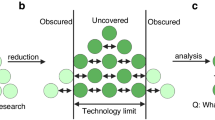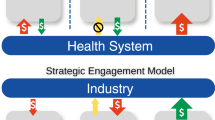Abstract
In the past decade, we have witnessed unprecedented changes and some remarkable advances that have enabled true personalized medicine. Nevertheless, many challenges in clinical cancer research remain and need to be overcome if we are to witness similar progress in the next decade. Such hurdles include, but are not limited to, clinical development and testing of multiple agents in combination, design of clinical trials to best accommodate the ever increasing knowledge of heterogeneity of the disease, regulatory challenges relating to drug development and trial design, and funding for basic research. With this in mind, we asked four leading cancer researchers from around the world, and who have been associated with the journal since its launch in November 2004 what, in their opinion, we have learnt over the past 10 years and how we should progress in the next 10 years.
This is a preview of subscription content, access via your institution
Access options
Subscribe to this journal
Receive 12 print issues and online access
$209.00 per year
only $17.42 per issue
Buy this article
- Purchase on Springer Link
- Instant access to full article PDF
Prices may be subject to local taxes which are calculated during checkout
Similar content being viewed by others
References
Kochenderfer, J. N. et al. Eradication of B-lineage cells and regression of lymphoma in a patient treated with autologous T cells genetically engineered to recognize CD19. Blood 116, 4099–4102 (2010).
Tran, E. et al. Cancer immunotherapy based on mutation-specific CD4+ T cells in a patient with epithelial cancer. Science 344, 641–645 (2014).
Simeone, E. & Ascierto, P. A. Immunomodulating antibodies in the treatment of metastatic melanoma: the experience with anti-CTLA-4, anti-CD137 and anti-PD1. J. Immunotoxicol. 9, 241–247 (2012).
Ascierto, P. A. et al. Clinical experiences with anti-CD137 and anti-PD1 therapeutic antibodies. Semin. Oncol. 37, 508–516 (2010).
Flaherty, K. T., Puzanov, I. & Chapman, P. B. Inhibition of mutated, activated BRAF in metastatic melanoma. N. Engl. J. Med. 363, 809–819 (2010).
Lynch, T. J. et al. Activating mutations in the epidermal growth factor receptor underlying responsiveness on non-small-cell lung cancer to gefitinib. N. Engl. J. Med. 350, 2129–2139 (2004).
Shaw, A. T. et al. Effect of crizotinib on overall survival in patients with advanced non-small-cell lung cancer harbouring ALK gene rearrangement: a retrospective analysis. Lancet Oncol. 12, 1004–1012 (2011).
Eggermont, A. M., Spatz, A. & Robert, C. Cutaneous melanoma. Lancet 383, 816–827 (2014).
Hodi, F. S. et al. Improved survival with ipilimumab in patients with metastatic melanoma. N. Engl. J. Med. 363, 711–723 (2010).
Topalian, S. L. et al. Survival, durable tumour remission, and long-term safety in patients with advanced melanoma receiving nivolumab. J. Clin. Oncol. 32, 1020–1030 (2014).
Robert, C. et al. Anti-programmed-death-receptor-1 treatment with pembrolizumab in ipilimumab-refractory advanced melanoma: a randomised dose-comparison cohort of a phase 1 trial. Lancet http://dx.doi.org/10.1016/S0140-6736(14)60958-2 (2014).
Brahmer, J. R. et al. Survival and long-term follow-up of the phase I trial of nivolumab (anti-PD-1; BMS-936558; ONO-4538) in patients (pts) with previously treated advanced non-small cell lung cancer (NSCLC) [abstract]. J. Clin. Oncol. 31 (Suppl.), a8030 (2013).
Powles, T. et al. Inhibition of PD-L1 by MPDL3280A and clinical activity in pts with metastatic urothelial bladder cancer (UBC) [abstract]. J. Clin. Oncol. 32 (Suppl.), a5011 (2014).
Wolchok, J. D. et al. Nivolumab plus ipilimumab in advanced melanoma. N. Engl. J. Med. 369, 122–133 (2013).
Eggermont, A. M. & Robert, C. Melanoma: smart therapeutic strategies in immuno-oncology. Nat. Rev. Clin. Oncol. 11, 181–182 (2014).
Peggs, K. S., Quezada, S. A., Chambers, C. A., Korman, A. J. & Allison, J. P. Blockade of CTLA-4 on both effector and regulatory T cell compartments contributes to the antitumour activity of anti-CTLA-4 antibodies. J. Exp. Med. 206, 1717–1725 (2009).
Kraman, M. et al. Suppression of antitumour immunity by stromal cells expressing fibroblast activation protein-alpha. Science 330, 827–830 (2010).
Wolchok, J. D. et al. Nivolumab plus ipilimumab in advanced melanoma. N. Engl. J. Med. 369, 122–133 (2013).
Hinrichs, C. S. & Rosenberg, S. A. Exploiting the curative potential of adoptive T-cell therapy for cancer. Immunol. Rev. 257, 56–71 (2014).
Lee, Y. et al. Therapeutic effects of ablative radiation on local tumour require CD8+ T cells: changing strategies for cancer treatment. Blood 114, 589–595 (2009).
Garcia-Barros, M. et al. Tumour response to radiotherapy regulated by endothelial cell apoptosis. Science 300, 1155–1159 (2003).
Lussier, Y. A. et al. Oligo and polymetastatic progression in lung metastasis(es) patients is associated with specific microRNAs. PLoS ONE 7, e50141 (2012).
La Thangue, N. B. & Kerr, D. J. Predictive biomarkers: a shift towards personalised cancer medicine. Nat. Rev. Clin. Oncol. 8, 587–596 (2011).
Kerr, D. J. & Kakil, I. R. Targeted therapies: cetuximab plus chemotherapy in patients with advanced cancer. Nat. Rev. Clin. Oncol. 6, 499–500 (2009).
Ou, S.-H. I. et al. Efficacy and safety of crizotinib in patients with advanced ROS1-rearranged non-small cell lung cancer (NSCLC) [abstract]. J. Clin. Oncol. 31 (Suppl.), a8032 (2013).
Dilts, D. M. et al. Development of clinical trials in a cooperative group setting: The Eastern Cooperative Oncology Group. Clin. Cancer Res. 14, 3427–3433 (2008).
Lacombe, D. et al. European perspective for effective cancer drug development. Nat. Rev. Clin. Oncol. 11, 492–498 (2014).
Edwards, A. M., Bountra, C., Kerr, D. J. & Willson, T. M. Open access chemical and clinical probes to support drug discovery. Nat. Chem. Biol. 5, 436–440 (2009).
Prahallad, A. et al. Unresponsiveness of colon cancer to BRAF(V600E) inhibition through feedback activation of EGFR. Nature 483, 100–103 (2012).
Ward, P. S. & Thompson, C. B. Metabolic reprogramming: a cancer hallmark even warburg did not anticipate. Cancer Cell 21, 297–308 (2012).
Heimann, R. & Hellman, S. Clinical progression of breast cancer malignant behaviour: what to expect and when to expect it. J. Clin. Oncol. 18, 591–599 (2000).
Coussens, L. & Werb, Z. Inflammation and cancer. Nature 420, 860–867 (2002).
Cogent Study Group. Meta-analysis of genome-wide association data identifies four new susceptibility loci for colorectal cancer. Nat. Genet. 40, 1426–1435 (2008).
Liao, M. et al. Aspirin use, PIK3C mutation and colorectal cancer survival. N. Engl. J. Med. 367, 1596–1606 (2012).
Domingo, E. et al. Evaluation of PIK3CA mutation as a predictor of benefit from nonsteroidal anti-inflammatory drug therapy in colorectal cancer. J. Clin. Oncol. 31, 4297–4305 (2013).
Hanahan, D. & Weinberg, R. A. Hallmarks of cancer: the next generation. Cell 144, 646–674 (2011).
Hanahan, D. & Weinberg, R. A. Hallmarks of Cancer: an organizing principle for cancer medicine. Cancer: Principles & Practice of Oncology. 10th edn, Ch. 2 (in press, November 2014).
Dunn, G. P., Old, L. J. & Schreiber, R. D. The three Es of cancer immunoediting. Annu. Rev. Immunol. 22, 329–360 (2004).
Grey, R. et al. Validation study of a quantitative multi-gene RT-PCR assay as a predictor of recurrence in stage II colon cancer patient. J. Clin. Oncol. 12, 4611–4619 (2011).
Church, D. et al. Toxgnostics: an unmet need in cancer medicine. Nat. Rev. Cancer 14, 440–445 (2014).
Author information
Authors and Affiliations
Corresponding authors
Ethics declarations
Competing interests
A.M.M.E. is on the scientific advisory board and receives honoraria from Bristol–Myers Squibb and Merck Sharp & Dohme Limited. D.J.K. is Director of the Oxford University spin out company, Oxford Cancer Biomarkers. The other authors declare no competing interests.
Rights and permissions
About this article
Cite this article
DeVita, V., Eggermont, A., Hellman, S. et al. Clinical cancer research: the past, present and the future. Nat Rev Clin Oncol 11, 663–669 (2014). https://doi.org/10.1038/nrclinonc.2014.153
Published:
Issue Date:
DOI: https://doi.org/10.1038/nrclinonc.2014.153
This article is cited by
-
Fasting to enhance Cancer treatment in models: the next steps
Journal of Biomedical Science (2020)
-
Feasibility and first reports of the MATCH-R repeated biopsy trial at Gustave Roussy
npj Precision Oncology (2020)
-
Fasting and cancer: molecular mechanisms and clinical application
Nature Reviews Cancer (2018)
-
Unsolved challenges of clinical whole-exome sequencing: a systematic literature review of end-users’ views
BMC Medical Genomics (2016)



